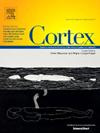Theory of mind deficits in non-fluent primary progressive aphasia
IF 3.3
2区 心理学
Q1 BEHAVIORAL SCIENCES
引用次数: 0
Abstract
Theory of Mind (ToM) is a complex socio-cognitive subdomain that is under-researched in neurodegenerative disorders, particularly in persons with primary progressive aphasia. We studied 14 persons with non-fluent/agrammatic variant primary progressive aphasia (nfaPPA), and asked two questions: (1) whether persons with nfaPPA have intact or impaired ToM, with emphasis on their false belief attribution abilities, relative to healthy controls; and (2) whether false-belief attribution (a component of ToM) is associated with their syntactic and executive function (EF) abilities. False belief understanding was tested through nonverbal videos, with participants deciding whether the story ending was an appropriate end of each video scenario or not. Syntactic production abilities were measured through repetition of syntactically simple and complex sentences (comprising length-matched complement and adjunct sentences), and EF tasks, specifically, a digit-back and an attention-shifting task. Persons with nfaPPA were less accurate than controls in adapting their reasoning to the false beliefs of other agents in the nonverbal videos of the false belief attribution task. Their false belief attribution performance was significantly predicted primarily by their syntactic production, followed by their EF. The overall findings suggest that persons with nfaPPA may have impaired performances in ToM tasks, due to impairments in basic non-social cognitive functioning, such as syntactic and EF abilities.
非流利性原发性进行性失语症的心智缺陷理论
心理理论(ToM)是一个复杂的社会认知子领域,在神经退行性疾病,特别是原发性进行性失语症患者中的研究尚不充分。我们研究了14例非流利/语法变异性原发性进行性失语症(nfaPPA)患者,并提出了两个问题:(1)与健康对照相比,nfaPPA患者的ToM是完整的还是受损的,重点研究了他们的错误信念归因能力;(2)错误信念归因(错误信念的一个组成部分)是否与他们的句法和执行功能(EF)能力相关。通过非语言视频测试错误信念理解,参与者决定故事结局是否适合每个视频场景。句法生成能力通过重复语法简单句和复杂句(包括长度匹配的补语和附加句)和EF任务,特别是数字返回和注意力转移任务来测量。在错误信念归因任务的非语言视频中,nfaPPA组的推理适应其他参与者错误信念的准确性低于对照组。他们的错误信念归因表现主要由句法生成显著预测,其次是EF。总体研究结果表明,患有nfaPPA的人在ToM任务中的表现可能受到损害,这是由于基本的非社会认知功能(如句法和EF能力)受到损害。
本文章由计算机程序翻译,如有差异,请以英文原文为准。
求助全文
约1分钟内获得全文
求助全文
来源期刊

Cortex
医学-行为科学
CiteScore
7.00
自引率
5.60%
发文量
250
审稿时长
74 days
期刊介绍:
CORTEX is an international journal devoted to the study of cognition and of the relationship between the nervous system and mental processes, particularly as these are reflected in the behaviour of patients with acquired brain lesions, normal volunteers, children with typical and atypical development, and in the activation of brain regions and systems as recorded by functional neuroimaging techniques. It was founded in 1964 by Ennio De Renzi.
 求助内容:
求助内容: 应助结果提醒方式:
应助结果提醒方式:


